Heavyweights from universities in the East and West addressed common missions and challenges for global higher education and shared experiences in making their colleges prestigious and even world-class on the sidelines of the just-concluded Boao Forum for Asia (BFA) annual conference in Boao in the southern Chinese province of Hainan.
While employment remains one of the major concerns among universities across the world, the development of students' cultural identities as well as value orientations are also a task not to be underestimated, according to the attending experts at the session "A Conversation with University Presidents: When East Meets West" held on Thursday.
What makes a world-class university?
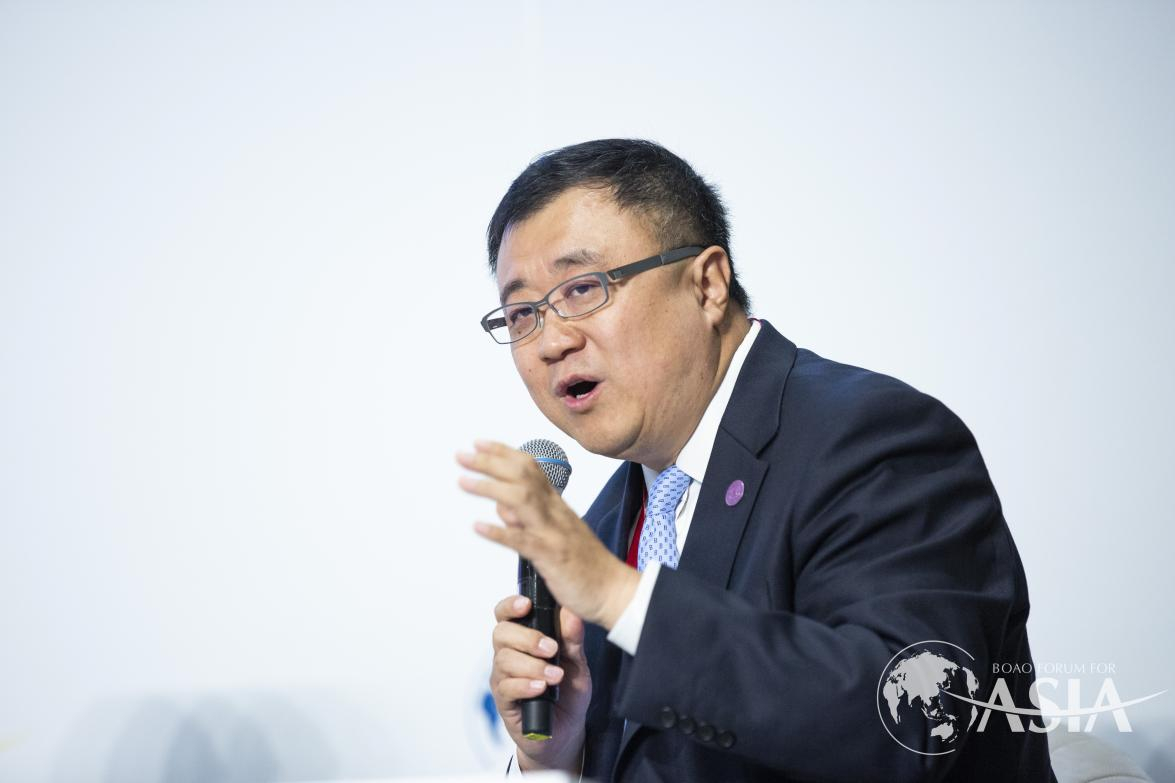
Yang Bin, vice president and provost of Tsinghua University, speaks at the session "A Conversation with University Presidents: When East Meets West" at the Boao Forum for Asia (BFA) annual conference on March 28, 2019. /Photo from the BFA official website
Yang Bin, vice president and provost of Tsinghua University, speaks at the session "A Conversation with University Presidents: When East Meets West" at the Boao Forum for Asia (BFA) annual conference on March 28, 2019. /Photo from the BFA official website
A world-class university thinks in the long-term, makes social contributions and has a global impact, Yang Bin, vice president and provost of Tsinghua University, said when asked to name three attributes of a world-leading university.
Tsinghua University, one of China's most highly-regarded institutions, became the first university from the Chinese mainland to make it into the world top 20 colleges in 2018, as per the latest QS World University Rankings released in June last year.
Making contributions to the world as a whole are also among the many characters expected from a prestigious university, said Kim Yong-hak, president of Yonsei University in South Korea, and Winston Soboyejo, provost of Worcester Polytechnic Institute, who called on top colleges to be actively engaged in offering solutions to global issues and inspiring innovation in various areas.
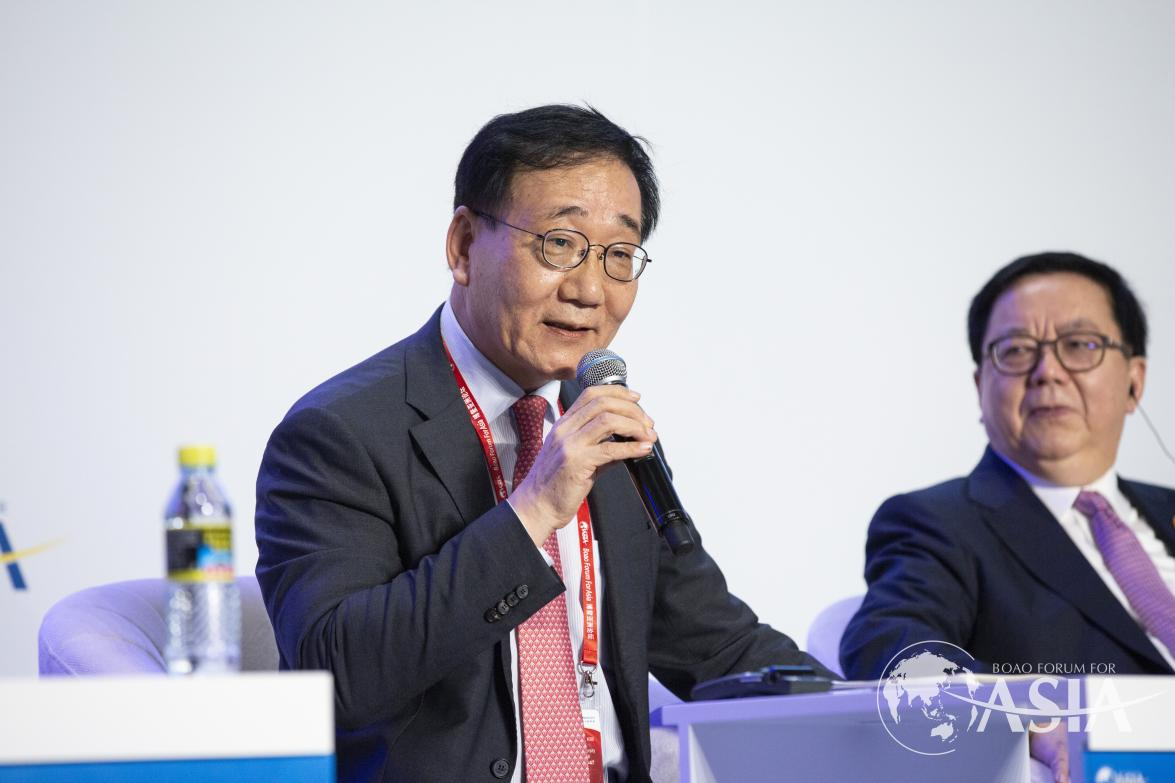
Kim Yong-hak, president of Yonsei University in South Korea, speaks at the BFA session on March 28. /Photo from the BFA official website
Kim Yong-hak, president of Yonsei University in South Korea, speaks at the BFA session on March 28. /Photo from the BFA official website
To become well recognized in the world, universities "have to produce knowledge that has social impact, produce social elites who can change the world, and get involved in social and global problems to solve them," Kim Yong-hak said.
Li Jiange, chancellor of Guangdong-Technion Israel Institute of Technology, also stressed the importance of having outstanding professors and advanced facilities to make a university world-class. "Established professors help set up first-class academic disciplines," according to Li.
What are the differences between universities in the East and West?
The atmosphere in class, as well as learning approaches, differ at universities in the East and West, the guests pointed out at the session.
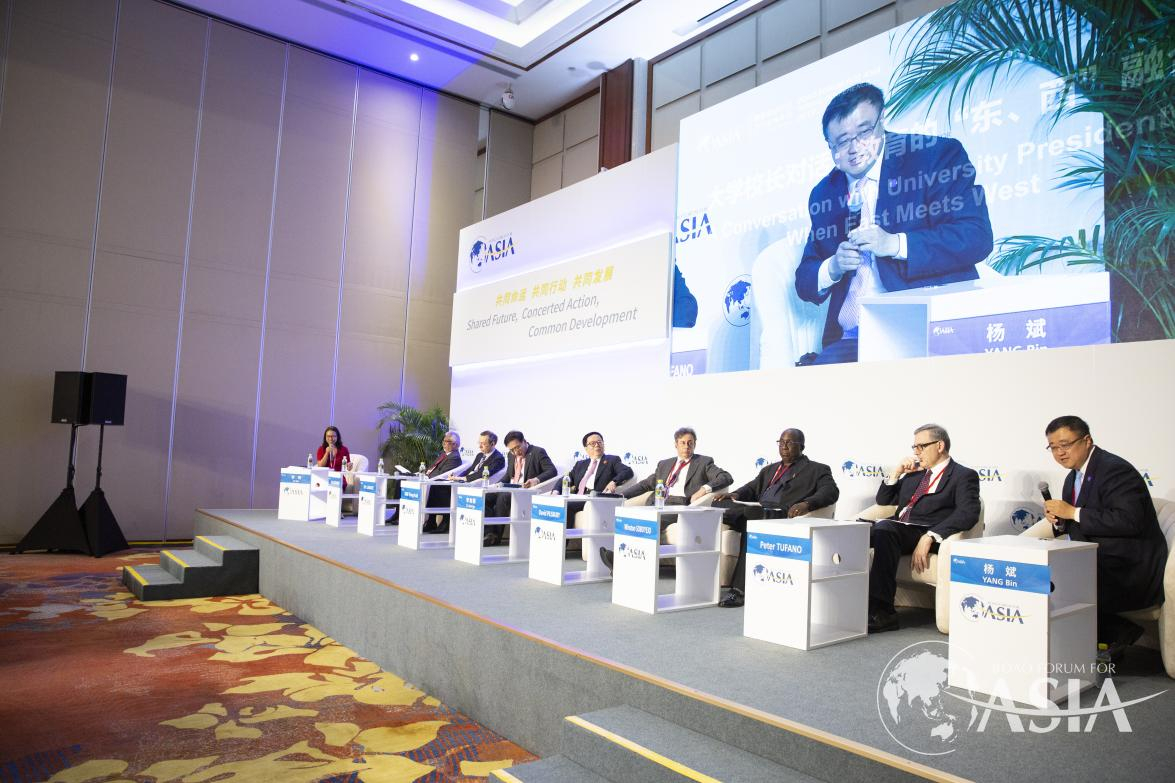
Panelists at the session "A Conversation with University Presidents: When East Meets West" during the BFA annual conference 2019 in Boao, south China's Hainan Province. /Photo from the BFA official website
Panelists at the session "A Conversation with University Presidents: When East Meets West" during the BFA annual conference 2019 in Boao, south China's Hainan Province. /Photo from the BFA official website
While Asian students are rather taciturn in class in line with their long-developed practice to learn through meditation and exercises, and respect professors as part of the campus discipline, those in western universities are encouraged to interact and challenge their professors to develop critical and creative thinking, the education experts said.
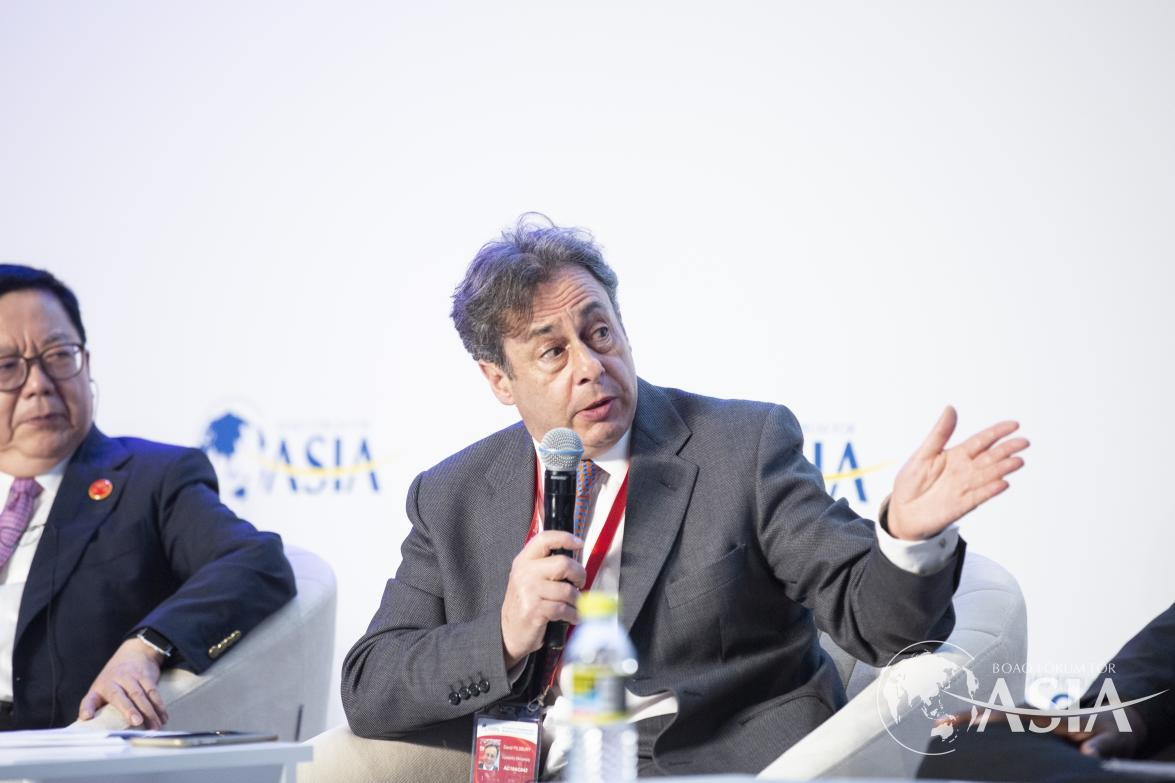
David Pilsbury, deputy vice-chancellor of Coventry University speaking at the BFA session. /Photo from the BFA official website
David Pilsbury, deputy vice-chancellor of Coventry University speaking at the BFA session. /Photo from the BFA official website
The fundamental nature of universities is all about providing students with a "safe place to be silly," to express and challenge ideas, said Pilsbury, pointing at higher education in the UK. Universities are "communities where people learn to think by themselves," he added.
To have students participate more in the classroom, Kim Yong-hak suggested "dispatching the classroom into the community" to solve real-life problems so that students and professors could work collectively through communication while enhancing the community welfare.
Besides approaches to acquire knowledge, the difference between students from universities in the East and West also lies in their planning for life, according to Yang Bin. While students in Asia may prefer to pursue their degrees one after another at a stretch under cultural influence and peer pressure, their western counterparts would take more time like a gap year to think what they truly long for before pursuing further studies.
What are the missions and challenges for today's higher education?
Despite the differences between eastern and western universities, higher education around the globe has faced shared challenges with employment of students after graduation remaining a major concern for the presidents.
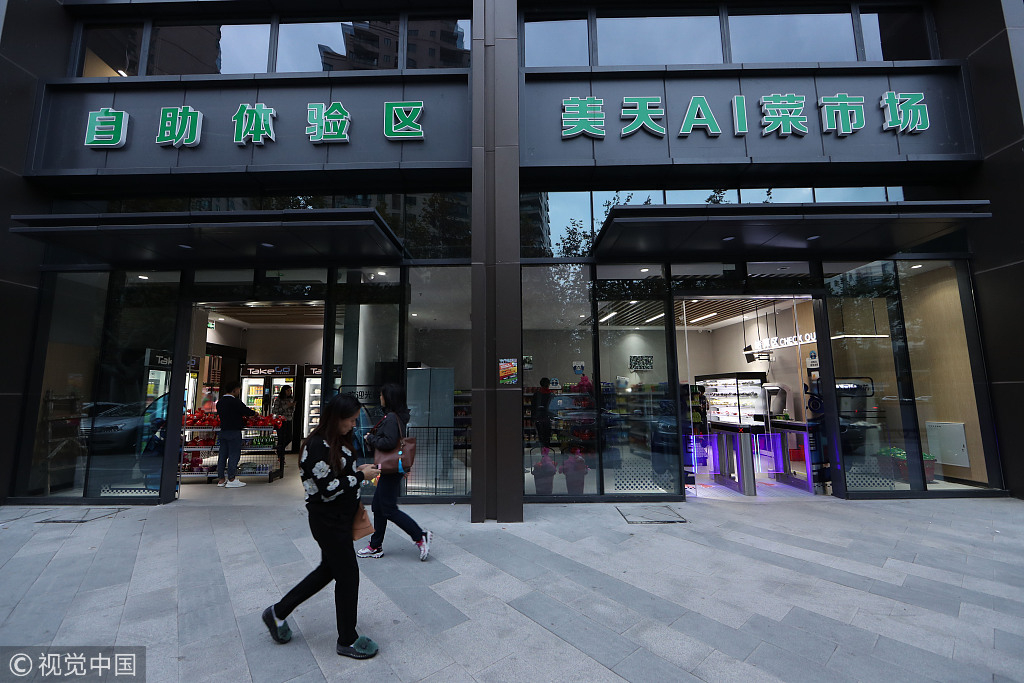
The first AI vegetable market in Shanghai opens on November 20, 2018. /VCG Photo
The first AI vegetable market in Shanghai opens on November 20, 2018. /VCG Photo
According to Kim Yong-hak, booming artificial intelligence (AI) has put a large number of occupations at risk of being replaced and thus added to the uncertainties for graduates in the labor market.
A recent study by the UK government has warned that 1.5 million jobs in England are in danger of being automated based on an analysis of 20 million people in the region in 2017. Young people, along with women and part-time staff, are more likely to work in roles at higher risk of automation, the Office of National Statistics (ONS) report concluded.
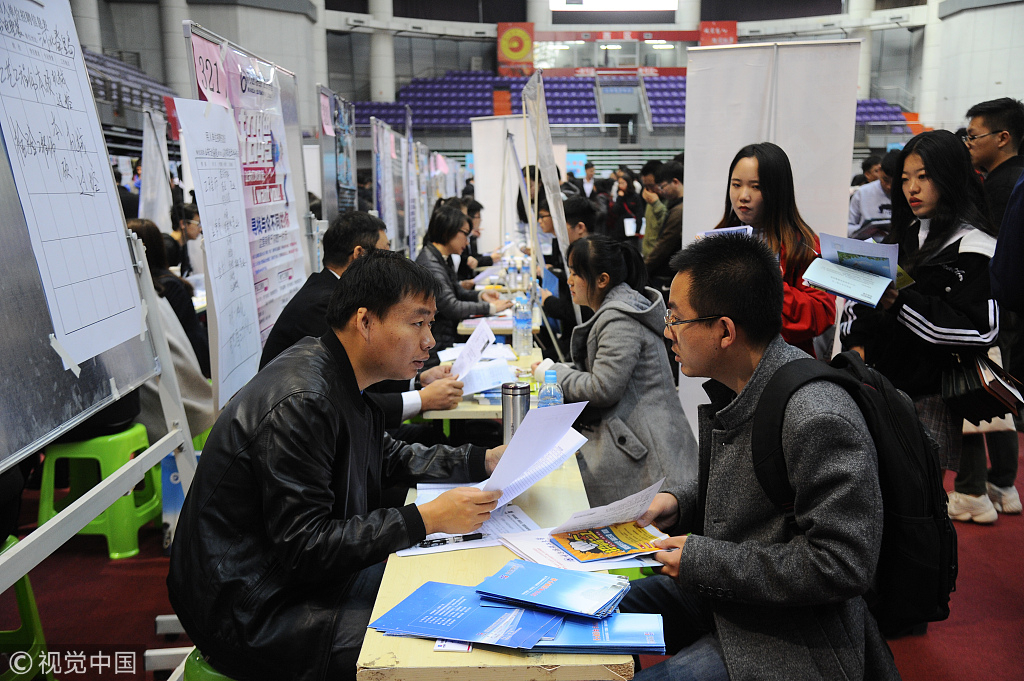
A job fair for university graduates in Harbin, northeast China's Heilongjiang Province. /VCG Photo
A job fair for university graduates in Harbin, northeast China's Heilongjiang Province. /VCG Photo
It is thus of great significance to make adjustments to the curricula so that students can meet the changing demands of job markets, vice chancellor of the University of Colombo Lakshman Dissanayak said, adding that the cultivation of entrepreneurship on campuses is also expected to help students become competitive in the workplace.
However, Peter Tufano, professorial fellow at Balliol College, University of Oxford, believes higher education is much more than just preparing students for jobs. "I worry a lot about humanity and social sciences," Tufano said. "We are not only teaching [them as] workers, but also voters, sisters, mothers and fathers."
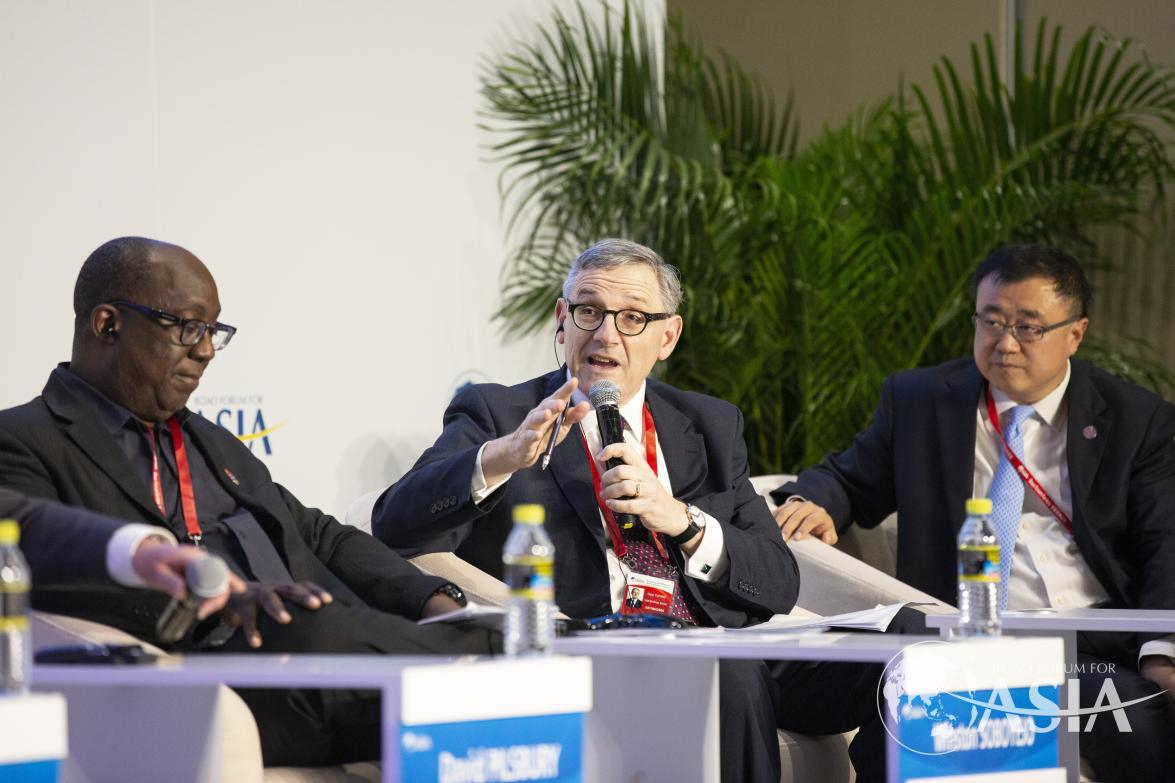
Peter Tufano, professorial fellow at Balliol College, University of Oxford, examines common challenges for global higher education at the BFA session on March 28. /Photo from the BFA official website
Peter Tufano, professorial fellow at Balliol College, University of Oxford, examines common challenges for global higher education at the BFA session on March 28. /Photo from the BFA official website
Tufano, along with Eric Labaye, president of École Polytechnique, a major French institution of higher education and research in sciences and engineering, also sees promoting sustainable development and cross-school collaboration as an important mission for universities.
Through introducing the concept of sustainable development into subjects and forging ahead in interdisciplinary cooperation, Labaye hopes universities could be able to provide sustainable solutions to global challenges.
The cultivation of students' local cultural identities is another tough task faced by universities around the world, especially in the era of globalization, Yang Bin reckoned. "There is still a lot of work for universities to do in fostering cultural identity of their students," he said.
(Top image from the official website of Boao Forum for Asia annual conference 2019)









